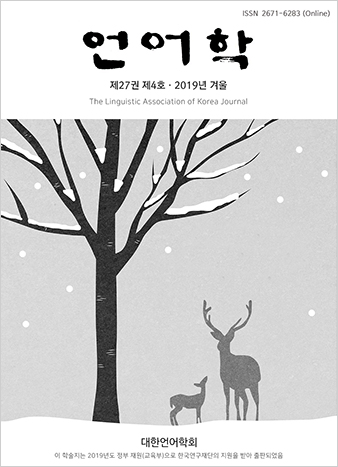대한언어학회 전자저널

-
Anyway as an Unassociative Stance Marker in the American Television Talk Show, Larry King Live
-
Influences of a Native English Teacher and Roles of a Co-teacher on L2 Learners' Learning Styles
-
On the Functions of the Simple Present Tense in The Pilgrim’s Progress
-
Teaching English through Vlogging and In-class Presentation: A Preliminary Comparative Study
27권 4호 (2019년 12월)
- 한국어 선어말 어미 ‘-시-‘의 사물 높임 현상과 공손 전략적 사용
-
최성화
Pages : 37-51
Abstract
Keywords
# 선어말 어미 ‘-시-’(pre-final ending ‘-si-’) # 사물 주체 높임(inanimate subject honorification) # 청자 높임(hearer honorification) # 수용성 판단(acceptability judgement) # 거절 화행(refusal speech act) # 체면 위협 행위(face threatening act) # 공손성(politeness)
References
- 김은혜. (2016). 한국어 선어말 어미 '-시-'의 사물 존대 기능. 사회언어학, 24(1), 91-113.
- 목정수. (2013). 선어말어미 '-시-'의 기능과 주어 존대. 국어학, 67, 63-105.
- 민지혜. (2014). '-시-'의 확대 사용 양상에 대한 문법 교육적 연구. 석사학위 논문, 이화여자대학교 교육대학원.
- 박석준. (2002). 현대국어 선어말어미 '-시-'에 대한 연구. 박사학위 논문, 연세대학교 대학원.
- 박석준. (2004). 선어말어미 "-시-"의 문법외적 용법에 관하여. 한말연구, 14, 201-220.
- 백수연. (2017). 한국어 주체존대 선어말어미 '-시-'의 공손 전략과 그 유용적 확장: 판매 담화 분석을 중심으로. 석사학위 논문, 서울대학교 대학원.
- 이두원. (2014). 영어의 청자존칭을 통해 본 사물주체존칭. 인문과학연구, 42, 201-223.
- 이래호. (2012). 선어말 어미 '-시-'의 청자 존대 기능에 대한 고찰. 언어학연구, 23, 147-166.
- 이상근. (2017). 실험통사론의 형식적 연구방법에 대한 고찰. 생성문법연구, 27(2), 395-429.
- 이수연. (2012). 서비스업 종사자들의 언어 사용 양상. 어문연구, 71, 79-97.
- 이숙의. (2015). 높임 선어말 어미 '-시-'에 대하여. 한국어학, 66, 215-244.
- 이정복. (1996). 국어 경어법의 말 단계 변동 현상. 사회언어학, 4(1), 51-81.
- 이정복. (2006). 국어 경어법에 대한 사회언어학적 접근. 국어학, 47, 407-448.
- 이정복. (2010). 상황 주체 높임 "-시-"의 확산과 배경. 언어과학연구, 55, 217-246.
- 이창덕. (2013). 현대 국어 비인칭 존대 현상과 그 교육적 대응 방안에 대하여. 한국초등국어교육, 53, 275-299.
- 임홍빈. (1985). {-시-}와 경험주 상정의 시점. 국어학, 14, 287-336.
- 조용준. (2015). 한국어 실험통사론의 모색. 박사학위 논문, 건국대학교 대학원.
- 홍종선, 곽숙영, 권용문, 문혜심, 이은희. (2009). 국어 높임법 표현의 발달: 국어 문법의 탐구 2. 서울: 박문사.
- Bard, E. G., Robertson, D., & Sorace, A. (1996). Magnitude estimation of linguistic acceptability. Language, 72(1), 32-68.
- Bernardy, J.-P., Lappin, S., & Lau, J. H. (2018). The influence of context on sentence acceptability judgements. Proceedings of the 56th Annual Meeting of the Association for Computational Linguistics (Volume 2: Short Papers), 456-461
- Keller, F. (2000). Gradience in grammar: Experimental and computational aspects of degrees of grammaticality. Unpublished doctoral dissertation, University of Edinburgh.
- Nagata, H. (1988). The relativity of linguistic intuition: The effect of repetition on grammaticality judgments. Journal of Psycholinguistic Research, 17(1), 1-17.
- Schütze, C. T., & Sprouse, J. (2014). Judgment data. In D. Sharma & R. J. Podesva (Eds.), Research methods in linguistics (pp. 27-50). Cambridge: Cambridge University Press.
- Schütze, C. T. (2016). The empirical base of linguistics: Grammaticality judgments and linguistic methodology. Berlin: Language Science Press.
- Sprouse, J. (2007). A program for experimental syntax: Finding the relationship between acceptability and grammatical knowledge. Unpublished doctoral dissertation, University of Maryland.